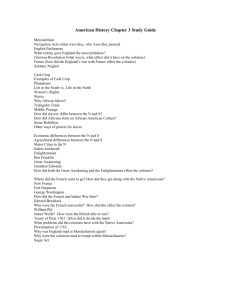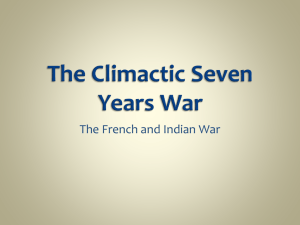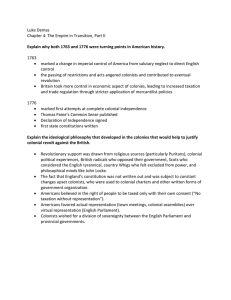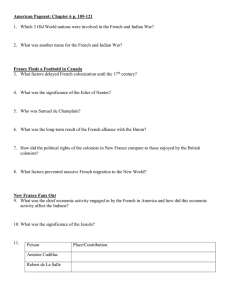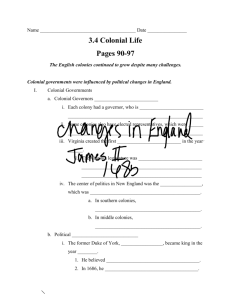Made laws, set policy - Garnet Valley School District
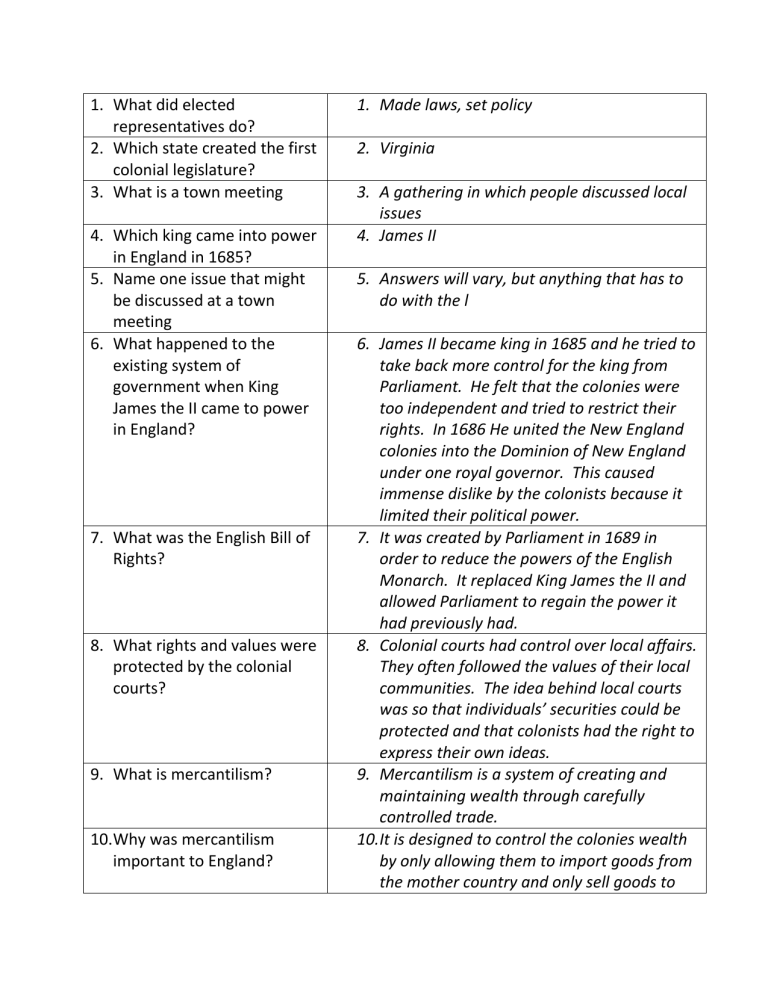
1.
What did elected representatives do?
2.
Which state created the first colonial legislature?
3.
What is a town meeting
4.
Which king came into power in England in 1685?
5.
Name one issue that might be discussed at a town meeting
6.
What happened to the existing system of government when King
James the II came to power in England?
7.
8.
9.
10.
What was the English Bill of
Rights?
What rights and values were protected by the colonial courts?
What is mercantilism?
Why was mercantilism important to England?
1.
Made laws, set policy
2.
Virginia
3.
A gathering in which people discussed local issues
4.
James II
5.
Answers will vary, but anything that has to do with the l
6.
James II became king in 1685 and he tried to take back more control for the king from
Parliament. He felt that the colonies were too independent and tried to restrict their rights. In 1686 He united the New England colonies into the Dominion of New England under one royal governor. This caused immense dislike by the colonists because it limited their political power.
7.
It was created by Parliament in 1689 in order to reduce the powers of the English
Monarch. It replaced King James the II and allowed Parliament to regain the power it had previously had.
8.
Colonial courts had control over local affairs.
They often followed the values of their local communities. The idea behind local courts was so that individuals’ securities could be protected and that colonists had the right to express their own ideas.
9.
Mercantilism is a system of creating and maintaining wealth through carefully controlled trade.
10.
It is designed to control the colonies wealth by only allowing them to import goods from the mother country and only sell goods to
11.
12.
13.
What were the Navigation
Acts?
Why were the Navigation
Acts put into place?
What was the Middle
Passage? the mother country.
11.
The Navigation Acts were put into place during 1650-1696 in order to control trade in the colonies to support the mercantilism system.
12.
England claimed it helped to stabilize the
American market. They controlled the sale and purchase of sugar and cotton. They required the use of English ships in order to transport products. Colonists used illegal markets to get products cheaper.
13.
It was the transport of millions of slaves across the Atlantic in exchange for rum.
Most of the slaves were taken to West Indies and to the southern colonies. The trip was terrible because as many slaves as possible were crammed on the ship in poor conditions. There was a very high death rate through the travel.
14.
Describe life for slaves along the Middle Passage. Give examples
15.
16.
17.
What was the Great
Awakening?
What leaders were important in the Great
Awakening and why?
What was important about the Enlightenment?
14.
Life was rough. They lived under the deck for 23 hours per day. Many died of disease.
They were packed onto the ship. The food and water were contaminated.
15.
The Great Awakening was a religious movement that swept through the colonies in the 1730s and 1740s. It changed the colonial religious practices as well as social and political life.
16.
Both Jonathan Edwards and George
Whitefield were ministers who taught the importance of sinners to seek forgiveness.
They held religious tent revivals through out the colonies.
17.
The Enlightenment was a movement which took place in the 1700s and spread the idea that reason and logic could improve society.
It started with improved study of science. It would later change views on government creating a social contract between the people and their government. John Locke wrote works that promoted liberty and equality for all people.
18.
What was King Philip’s War? 18.
King Philip’s War took place in 1675 between a group of New England colonists and Wampanoag Native Americans. The
Natives were tired of colonists moving in and take more and more of their lands. The colonists created a colonial militia to fight against the Natives. In the end 600 colonists and 3,000 Native Americans were killed.
19.
Why did some Native
Americans allied with the
French while others allied with the English?
19.
Many Native Americans allied with groups of colonists who they had established good trade relationships. It was beneficial for the
Natives to trade furs for tools and weapons that they could not produce. The
Algonquian and Huron allied with the French while the Iroquois League allied with the
English. More tribes allied with the French because they had kept their settlements small in size and had placed the fewest restrictions on Native American
Independence.
20.
What caused the war between the French and the
English in 1753?
20.
Both France and Great Britain struggle over the territory in the new world because of its rich value in the fur trade industry. They were fighting over the Ohio River Valley because the British were moving further
West into French claimed lands and the
French were losing money. Both sides built forts to protect their lands. Fighting started
in 1753 when George Washington arrived with the British military. Washington’s troops counted more than the French, but lost the first battle at Fort Necessity in 1754.
21.
What is the Albany Plan? 21.
Headed by Benjamin Franklin his idea was to unite all of the British colonies to fight against the French. It was not as successful because the war did not touch every colony.
22.
The Treaty of Paris ended the war in 1763. 22.
What were the outcomes of the Treaty of Paris? Great Britain was victorious and received
Canada, all land east of the Mississippi except New Orleans, and from Spain Florida.
23.
Why did Chief Pontiac rebel? 23.
Colonists slowly moved west as the eastern
24.
What was the Proclamation of 1763? portions of the colonies populations grew.
Chief Pontiac and other Native American leaders opposed this movement because the colonists were encroaching on more of their land. Pontiac’s Rebellion began in May 1763 when he attacked British Forts on the frontier. The king feared more attacks would come so he created the Proclamation of 1763.
24.
The Proclamation of 1763 banned British colonial settlement west of the Appalachian
Mountains in response to Native American attacks.
